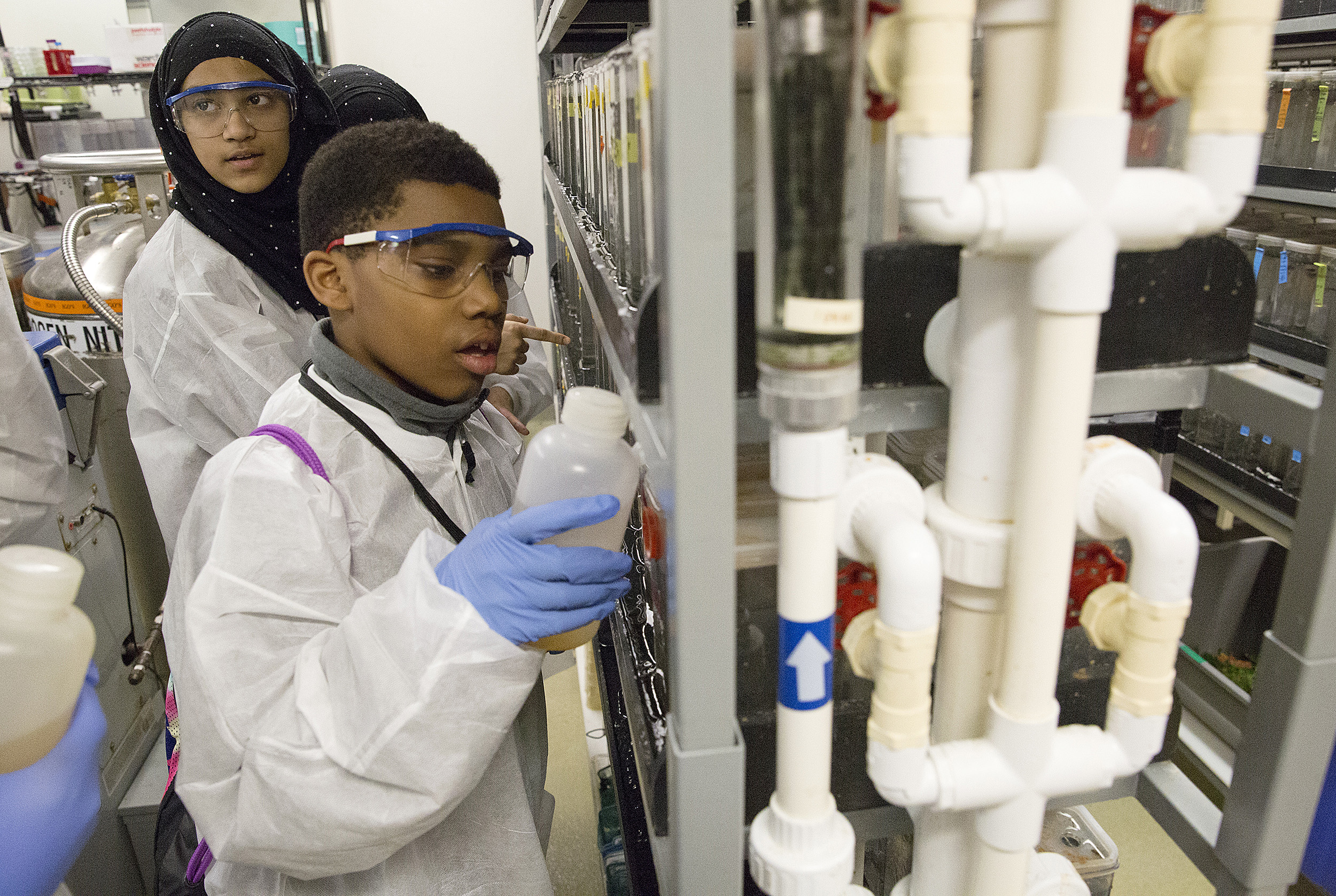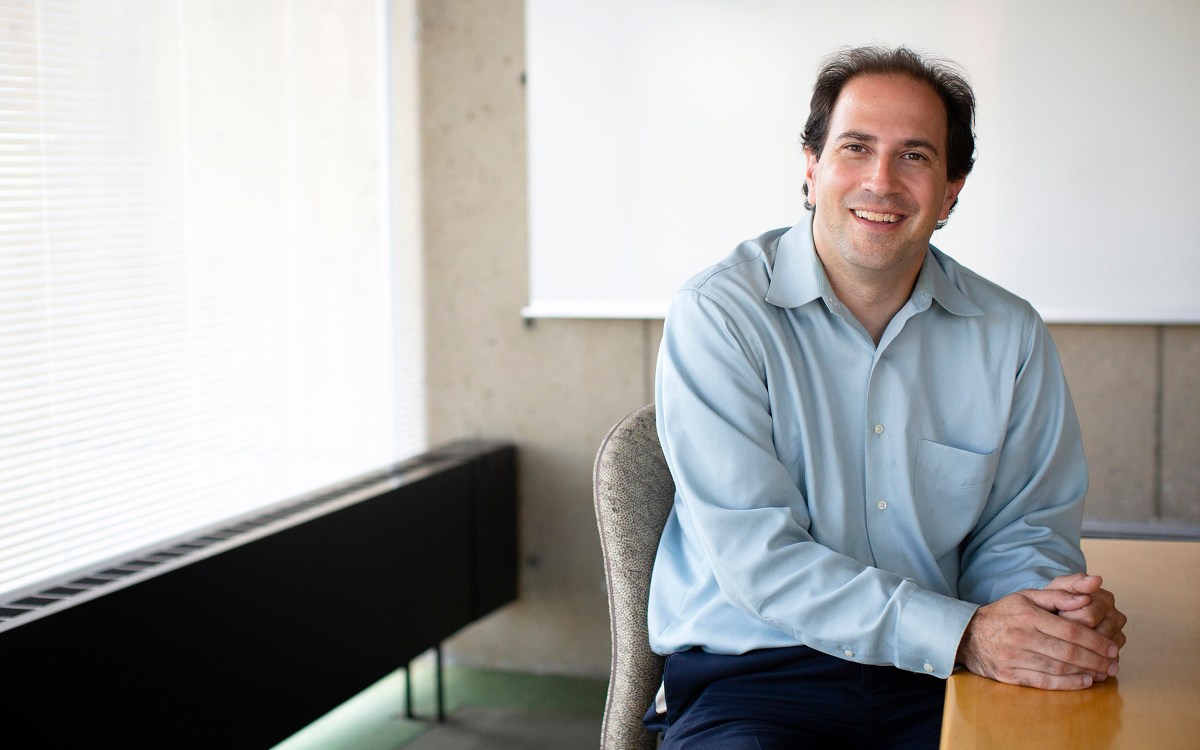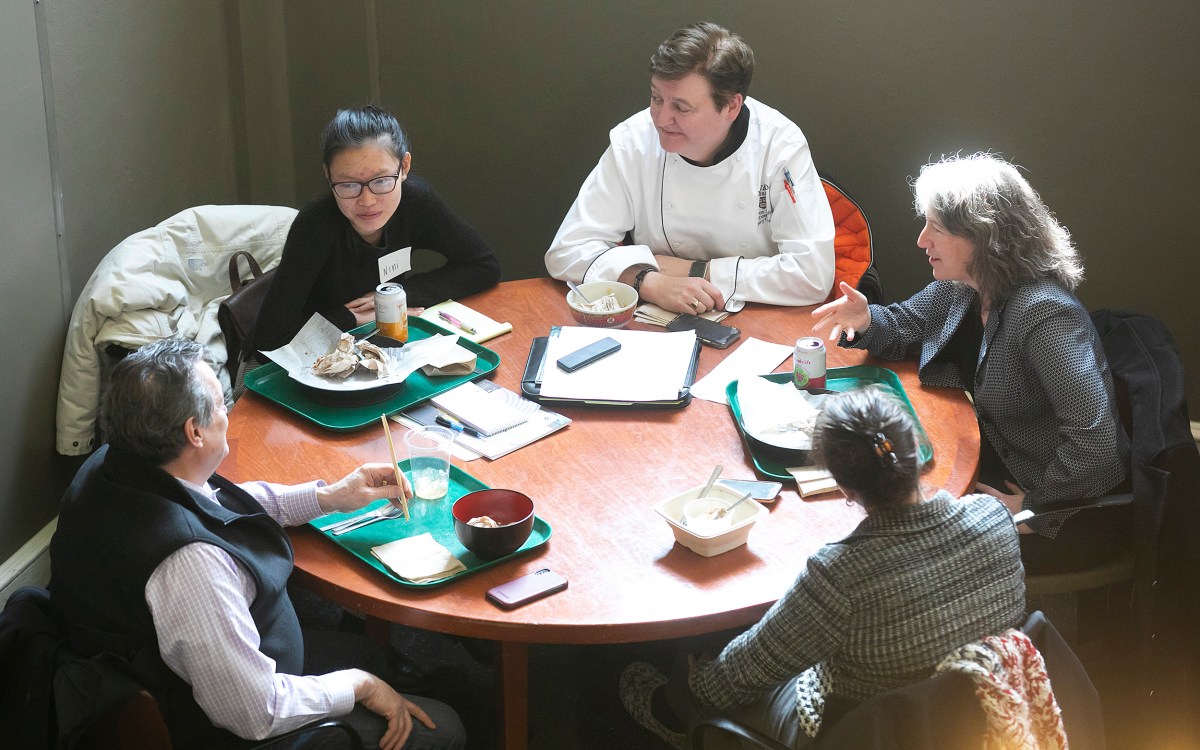
Jojo Frith and classmate Shuhana Noor (left) participated in the 2017 Project Teach program.
Jon Chase/Harvard file photo
Illuminating the path to college
Project Teach nudges students toward higher education by showing them that others like them have made it and by demystifying the process
Back when Nathan Oalican was going to Phineas Bates Elementary in Roslindale, his teacher, Joel Clark, invited a Harvard student to visit class one day.
“I vividly remember how he spoke about how he was once just like us — from Boston — and was once in Mr. Clark’s class,” said Oalican ’21. “He told us about how he worked hard, studied hard, and how that drive got him into College. I was only 10 or 11, but it clicked. It backed up what Mr. Clark was always saying to us about working hard, and how taking our education seriously would lead to results we could be proud of.”
Being shown the path worked for Oalican, and it turns out he’s not alone.
Studies have found that students begin envisioning themselves as going — or not going — to college as early as middle school. When they see someone who looks like them, or who has a background similar to theirs, attending college begins to feel less foreign and more possible.
It was in response to such findings that Harvard created Project Teach about two decades ago to ensure that students have the tools and support they need to foster the belief that higher education will be part of their future. The program has reached more than 6,800 seventh-grade students over the years in the neighborhoods of Allston and Brighton and throughout Cambridge. Building on that success, the initiative has also expanded to include a component for eighth-graders, one for high school juniors, and later this fall, one for sixth-graders.
“Envisioning oneself as a college student helps young people begin college planning,” writes Harvard Graduate School of Education’s Mandy Savitz-Romer. In “Ready, Willing, and Able: A Developmental Approach to College Access and Success,” Savitz-Romer and her co-author, Suzanne Bouffard, argue that prior research by developmental psychologists on identity development can be applied to both youth and the process of developing a “college-going identity.”
Savitz-Romer, a former school counselor, and Bouffard suggest that several components are critical in promoting a college-going culture among students; communication about college goals and terminology; sharing college information and resources; a sense of partnership with college students, faculty, and the college itself; and the ongoing involvement of family.
Every year Project Teach works with seventh-graders from nearly a dozen public schools. A cornerstone of the program is a day on Harvard’s campus, where the students get a tour and a chance to take part in a specially-designed class of their choosing. The options typically include things like science-based sessions, complete with experiments; backstage workshops at the American Repertory Theater; talks on Russian history; and even examinations of the history and culture of hip-hop.
They eat lunch at historic Annenberg Hall and hear from undergrads about their experiences, subjects they can study, and College life in general.
“The Project Teach program is a critical component of our district’s efforts to prepare our students for post-secondary success,” said Kenneth Salim, Ed.D. ’11, superintendent of Cambridge Pubic Schools. “The annual trip to Harvard is a highlight of the year — we are fortunate that every seventh-grade student has the opportunity to see firsthand and up close what it’s like to be on a college campus.”
A recent evaluation of Project Teach participants found that by taking part in the program, students increased their belief that they knew where to go to ask questions about college, that college can be “fun,” and that diversity does exist on campuses.
The program has made such an impression that in recent years it’s expanded.
“For starters, we decided to broaden access,” said Joan Matsalia, associate director of Harvard’s Public School Partnerships team, which runs the initiative. “While the program has been available to our local schools for nearly 20 years, materials are now available online for teachers, school counselors, and administrators, from the local community to across the country, to access. From slides to activities to checklists to discussion prompts — we wanted to offer tools and suggestions to enable any teacher, parent, or student to get started on their own college-going identity journey. We’re also incredibly grateful to the Boston and Cambridge educators who took the time to meet with us and provide feedback on ways to strengthen the program.”
“What I strive to convey is: Look around — there are people who are just like you here. They need to see that they can do it too.”
Nathan Oalican ’21
Public School Partnerships also recently launched Level-Up: How to Succeed in High School and Beyond, a program to help prepare eighth-graders as they start transitioning to high school. Students discuss identity and self-advocacy, and make a game plan for next steps on their pathway to success.They learn how, who, and when to ask for help in high school; how to have difficult conversations with parents or guardians; and even how to navigate school as a first-generation student.
And piloted this past spring, the Reimagining Identity, Self, and Excellence (RISE) program brought a group of high school juniors from Cambridge and Boston onto Harvard’s campus to have an open and honest discussion about what life after high school might mean for them.
The RISE students talked about racial identity, securing financial aid, and how to handle adversity. They attended a college and career fair to learn about opportunities in higher education — from four-year colleges and universities to community colleges to certificate programs — and explored options such as AmeriCorps, City Year, and trade apprenticeships.
They also got a sobering but inspirational presentation from current College students about how they overcame their hurdles. One young woman, who identified as low-income and undocumented, talked about how she navigated those challenges and today is successfully enrolled and thriving. Another described how he was deported after high school, made his way back to the U.S., joined the military, and is now finishing a masters’ degree.
Oalican, who gives the local middle school students tours and answers their questions during the on-campus visits, knows from experience how effective programs like this can be.
“What I strive to convey is: Look around — there are people who are just like you here,” he said. “People who may have come from different socio-economic backgrounds, or people who may not have even considered college, who are now here. A lot of us were just like them not too long ago. They need to see that they can do it too.”
[gz_banner_50states /]







